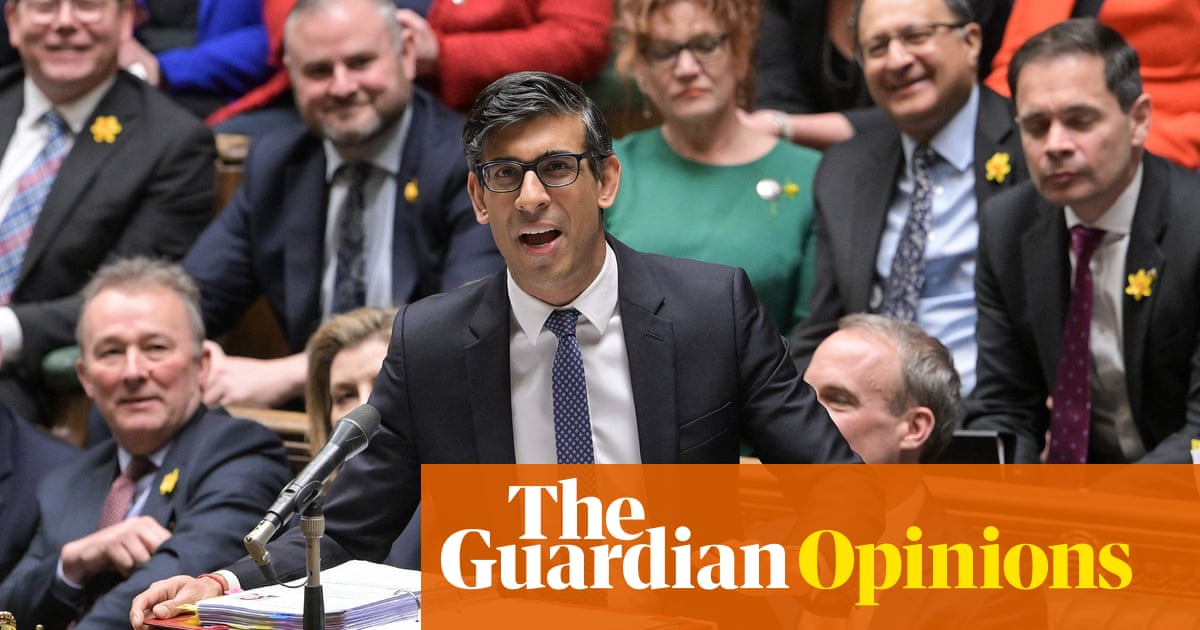
here has been no year like the past one, when Keir Starmer was elected Labour leader. He arrived just when opposition point-scoring was not wanted. Days after Starmer’s election, the Covid-stricken prime minister was taken to hospital, where he was later moved to intensive care.
That set a tough stamp on Starmer’s first year: the “constructive opposition” he proffered was all that was feasible at the time.
During the pandemic, all voters have wanted is to escape this horror. Listen to every conversation, and what you hear is vaccination dates, longing for unlocking, the chance to hug grandchildren and wistful hopes of holidays.
“Why doesn’t he define himself?”, ask some critics impatiently, as Labour’s public approval ratings tumble. Where’s his vision? Do something! Reshuffle, turn left, shout louder, attack!
What these critics forget is that politics is a seesaw with simple political physics. When the government is up, the opposition is down, and vice versa. This government now has an 86% approval rating – yes, 86% – on the vaccination programme, the only subject in town. Rob Ford, professor of political science at the University of Manchester, tells me he can think of virtually no similar approval rating happening before on the top issue of the day. Scientific genius and the efficiency of the NHS have gifted Boris Johnson an undeserved bounty. Parked at the other end of the seesaw, no amount of political vision could rescue Starmer from this downward bump.
He hasn’t wasted the year. Mending the sinking ship he inherited from Jeremy Corbyn holed 20 points below the waterline, he has scrubbed at the stains of antisemitism, cleared his HQ of those who delivered the car-crash election, taken control of the national executive, installed a serious shadow cabinet and has a strong new leader in Scotland. At PMQs he skewers prime ministerial bluster.
Naturally the Corbynites don’t like it, but he is polishing the party’s armour for when politics properly resumes. Starmer supporters are taking fright at the polls, mistaking his strategy for vacillation. Itching to charge full tilt and fire all their ammunition, they ignore the doctrine of the right time.
After a year without meeting a voter face to face, this summer Starmer will crisscross the country on a town-hall tour: he talks of “taking the mask off and opening the throttle”. In an Ipsos Mori poll, a hefty 31 were neutral, saying they didn’t know him or what he stood for. Will he cut through? He doesn’t do barnstorming rallies of billowing rhetoric. He won the leadership with meetings where he talked powerfully for a few minutes, laying out principles on public services, inequality, education and skills, but spent most time on direct answers to questions. He left people feeling that they grasped what he stood for.
Starmer’s real test will come when politics resumes and the country will need a fiercely combative opposition. His themes will be all too easy. As Covid support is withdrawn, all the underlying reasons why Britain was so undefended from the virus will be laid bare. Unemployment will rise. The NHS will stagger under a huge backlog. Schools will struggle to meet the needs of children who were abandoned without laptops. Food banks will face yet more hungry families, while gap-toothed high streets will depress neighbourhoods. Brexit will be biting harder.
The chancellor, Rishi Sunak, will dash to repair the country’s finances, while the Tory benches bay to rein in the ballooning cost of state spending. Every one of Sunak’s instincts will send him down George Osborne’s austerity path, with few lessons learned. That future is already cemented into his budget, imposing what amounts to an 8% cut on all departments bar defence, schools and the NHS: these last two still lack funds for their alarming needs. Johnson can deny austerity with eye-catching projects, but there will be no hiding what is engraved in the budget’s red lines.
The Tories have not seen how economic times have changed since last they accused Labour of spend-thrift profligacy. This time Starmer is free to borrow and propose a Franklin D Roosevelt-style New Deal, investing in jobs, people, children, biosciences, arts and the public realm. Now Joe Biden has set the fiscal benchmark with his £1.9tn “American rescue plan”, nothing can stop Britain following in his footsteps. It’s Tory austerity that is badly out of time.
Strategically, Labour will have more ammunition than it can fire: the message is that the country can’t afford another decade of Tory destitution. Starmer talks of the inequality “fault lines” and “weakened foundations” that left Britain shamed by the highest death toll and worst recession in Europe. As he wrote in the Observer, the government makes “cuts for nurses and tax breaks for second-home owners” while “handing out billions of pounds in crony contracts”. It’s no “blueprint for a new Britain”.
Sleaze is what fells Tory governments, and this government has handed Labour one sledgehammer after another. Rachel Reeves is making headway as shadow cabinet sleaze-buster against the tide of government dishonesty and naked pilfering. There is no escape from the stink of the Cameron scandal: for a former prime minister to have lobbied the Treasury on behalf of Lex Greensill’s supply-chain finance company, and to have reportedly boasted that he stands to profit by $60m from his shares in the firm, according to the Times, is a breathtaking abuse of the highest office. He only broke no law because he left a loophole in his weak anti-lobbying rules big enough to climb through.
Here’s where patriotism bites: cronyism kills Britain’s prized self-image as “clean” and “uncorrupt”. Here’s where Labour can lay claim to the union flag – to clean it up: no more British tax havens laundering global dirty money. No more crony contracts for chums. Housing secretary Robert Jenrick’s gift of planning permission for subsequent Tory donor Richard Desmond, and Jennifer Arcuri’s privileged access to trade missions during her affair with Johnson, add to a rising tide of sleaze.
Wave the flag for the Good Law Project’s latest sally, taking legal action against the £4.8bn “levelling up” fund that ignored the index of deprivation, to fund wealthier Tory seats – Sunak’s Richmond, Jenrick’s Newark – but not poorer Labour Salford and Barnsley. An MP claiming for duck houses shocked the public during the expenses scandal. But these accusations run deeper and darker into the establishment. Labour people shouldn’t wince at the union flag, but appropriate it themselves for decent values. Woke? Of course: embrace that, too, as no more than a fundamental, unifying sense of fairness.
Labour is always up against impossible odds, and the local elections may yield weak results. But ahead are volatile political times. The vaccination bounce will pass: as Rob Ford told me, voters don’t do gratitude. This prime minister and his cabinet of inadequates are incapable and unwilling to meet Britain’s daunting post-Covid emergencies. Johnson’s charisma will wear very thin, and neither bogus theatrical promises nor culture war political “traps” will disguise the threadbare realities. For now, have patience, you Labour supporters, until Covid has passed.
Polly Toynbee is a Guardian columnist












